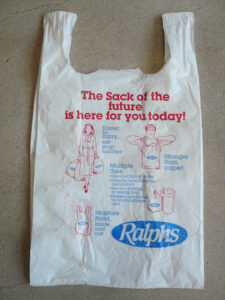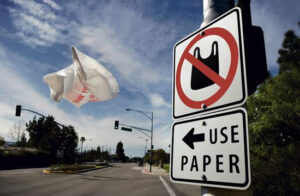Go Plastic Bag Free!
By Jamie McPherson, Your Own Home
“Good afternoon. Paper or plastic?”
“Neither. I brought my own.”
A new plastic bag ban is here to stay in Delaware. Following the lead of states from Maine to Oregon, Delaware has taken up the charge to reduce single-use plastics in an effort to combat excess waste, overflowing landfills, and devastating impact on marine life by passing House Bill 130.
Brief History of the Plastic Bag
Created by accident in 1933, polyethylene (the most commonly used plastic) was originally used secretly by the British military during World War II. It took almost thirty years for the plastic shopping bag we know today to be patented by Celloplast of Norrkoping, Sweden. By 1979, 80% of shopping bags in Europe were plastic, manufacturers began marketing heavily in the U.S. When supermarket giants Safeway and Kroger converted from paper to plastic around 1982, plastic became the de facto national grocery bag. Six years later, NOAA published a paper outlining the recently discovered “Great Pacific Garbage Patch” highlighting its (currently) 1.6 million square kilometer footprint containing 80,000 metric tons of plastic. Considering Americans use 100 billion plastic bags a year, this comes as no surprise. It only took one decade for the plastic bag to turn from convenience into an ecological disaster.
Be Part of The Solution
Want to be part of the problem’s solution? Abandon your single use plastics in favor of, well, that’s up for debate. Reusable heavy plastic rarely returns to the store for the next shopping trip, and paper bags rely on harvesting timber before a carbon-unfriendly manufacturing process. Cotton or canvas bags will last a lifetime but are also heavy and usually smaller.
Recently there has been an influx of non-woven PPE bags which are inexpensive, lightweight, environmentally friendly, and stand up to abuse. Many are washable. There are also coated versions of most reusable bags, which ensure moisture won’t penetrate, along with insulated totes for cold food. Another alternative is compostable bags, which come in many sizes and break down quickly. You’ve got choices; the key is consistent use.
Develop New Habits
Experts agree that whatever you decide to use, be sure to reuse! Anything is better than throwing away plastic, only to have it end up spending one thousand years (the time it takes plastic to break down) in a landfill or ocean. Develop new habits, like leaving a few bags in the car for unexpected stops at the grocery store or lining a trash can with a compostable bag.
Caring for our planet requires a little thought and planning, but when we all commit to basic changes in our routines, the impact will be felt globally and last for generations. Celebrate “International Plastic Bag Free Day” this July 3rd by committing to a plastic-free lifestyle and tell others why you’re doing it!
At Your Own Home, we care about you, your family and our environment. Your Own Home, LLC provides personalized In-Home Care Plans that meet a person’s every need, from companionship to medication management to housekeeping and everything in between. Call us today at 302-478-7081 or email info@yourownhomecare.com to find out how we can help you or your loved one. We’re here for you!





